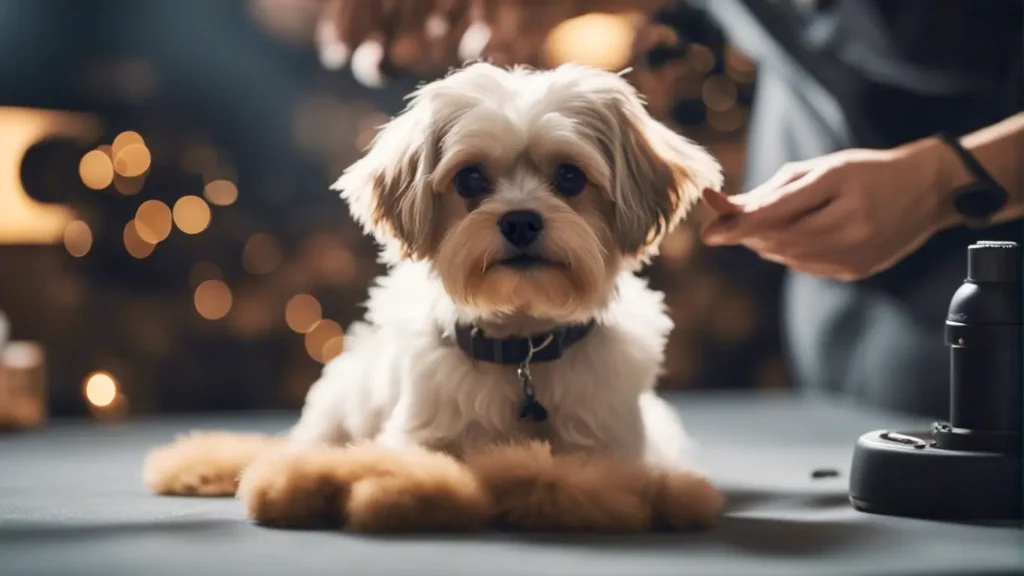Small dog breeds are generally defined as dogs that weigh less than 22 pounds as adults. They make up some of the most popular types of dogs, especially for urban pet owners.
Some key advantages of small dog breeds:
- They require less space and can thrive in apartments or small homes. Their smaller food and supply needs also make them more affordable.
- Small dogs typically have longer lifespans than larger breeds. Many live well into their teens.
- Their portable size makes them easy to travel with and less difficult to transport.
- Small dogs tend to have prominent personalities packed into their tiny bodies! They are often described as spunky, energetic, and affectionate.
Small dogs became popular in the 20th century as urban living became more common. Their convenient size made them well-suited as companion pets for city dwellers. Today, small dog breeds remain one of the most in-demand types of dogs.

When choosing a small breed, it’s important to consider:
- Grooming needs – some have high-maintenance coats.
- Activity level – Some small breeds are very energetic.
- Tendency to bark – Some small dogs bark more than others.
- Personality – Some are independent, while others are Velcro dogs.
Researching to find the right personality and activity match is critical to finding the perfect small breed for your lifestyle. While tiny, small dogs have big hearts and loads of love to give!
The History of Small Dog Breeds
Small dogs emerged thousands of years ago, though their origins are unclear. Here is an overview of how small dog breeds developed over time:
- Ancient Times: Remains of small dogs under 20 pounds have been found buried alongside humans dating back over 12,000 years. These early small dogs likely emerged through the domestication of wolves.
- Ancient Egypt: Artifacts from Ancient Egypt depict toy dog breeds similar to today’s Maltese. These small lapdogs were likely the companions of royal families.
- Ancient Rome: Frescos from Pompeii show images of small dog breeds resembling modern-day Chihuahuas and Pomeranians. The ancient Romans seemed fond of tiny dog companions.
- Middle Ages: During the Middle Ages, toy dog breeds became popular as companion pets, especially among the nobility. Popular small breeds included miniature greyhounds and pugs.
- 16th Century: The modern era of dog breeding began in the 16th century. Toy breeds like the Pomeranian, Chihuahua, and Papillon emerged through selective breeding for small size.
- 19th Century: The 19th century saw the development of many modern small dog breeds. The Cavalier King Charles Spaniel, Yorkshire Terrier, and Pekingese were all established during this period.
- 20th Century: Many new small dog breeds were formed in the 20th century to meet demand, including the Shih Tzu, Miniature Pinscher, and Havanese. The popularity of small dogs continued to grow.

While their origins may be murky, small dogs have a long, rich history as beloved companion pets worldwide. Today’s most popular small breeds trace their ancestry back centuries or even millennia.
Small Dogs Breed List
- Affenpinscher
- Australian Terrier
- Bichon Frise
- Bolognese
- Border Terrier
- Boston Terrier
- Brussels Griffon
- Cavalier King Charles Spaniel
- Chihuahua
- Chinese Crested
- Coton de Tulear
- Dachshund
- English Toy Spaniel
- French Bulldog
- Havanese
- Italian Greyhound
- Japanese Chin
- Lhasa Apso
- Maltese Terrier
- Manchester Terrier
- Miniature Pinscher
- Miniature Schnauzer
- Norfolk Terrier
- Norwich Terrier
- Papillon
- Pekingese
- Pomeranian
- Pug
- Russkiy Toy
- Shih Tzu
- Silky Terrier
- Toy Fox Terrier
- Yorkshire Terrier
The Benefits of Owning a Small Dog
Small dogs offer many advantages that make them a popular choice for pet owners:
- Easier to House Train: With small bladders, small dogs need to go out more frequently. This makes house training easier than for larger breeds. Frequent trips outside establish a solid potty routine.
- Lower Costs: Small dogs cost less than big dogs, from food to grooming to medical care. Their petite appetites mean you’ll save on food bills.
- Ideal for Apartments: A small dog can thrive in a limited space. Their smaller exercise needs make small dogs well-suited to apartment living.
- Portable: It’s easy to bring a small dog with you places. They can ride in carriers or bags and are allowed in areas prohibiting larger dogs.
- Long Lifespans: Small dogs generally live longer than their larger counterparts, with an average lifespan of 13-18 years. You get to enjoy their company for many years.
- Low Shedding: Many popular small breeds shed minimally, making them ideal for those with allergies. Breeds like Shih Tzus and Maltese are hypoallergenic.
- Loving Companions: What small dogs lack in size, they make up for in affection! They love being lap dogs and thrive when showered with attention.

Owning a small dog can enrich your life with unconditional love. Their petite size makes them adaptable pets for various living situations. Despite their small stature, they have huge hearts and vibrant personalities.
The Challenges of Owning a Small Dog
While small dogs make excellent pets, there are some potential drawbacks to consider:
- Fragility – Their tiny bodies are more fragile and prone to injury, especially if accidentally stepped on or dropped from high places. Supervision is key.
- House Training – Small bladders mean they need to go out more often. Frequent accidents can happen if not let out consistently.
- Barking – Small dogs are more likely to bark excessively. Their high-pitched barks can irritate neighbors. Training is needed to curb barking.
- Separation Anxiety – Small breeds frequently suffer from separation anxiety when left alone. This can lead to destructive behaviors.
- Veterinary Costs – Although they eat less, vet bills for small dogs are often higher due to their greater susceptibility to health issues.
- Socialization – Unsocialized small dogs may become aggressive or fearful around other dogs or people. Early socialization is essential.
- Grooming – Many small dog breeds require regular grooming and haircuts, adding to the cost and time commitment.

Ways to Overcome Challenges
- Use positive reinforcement training to potty train and curb barking.
- Crate train to prevent destruction when alone. Provide stimulating toys.
- Socialize early and often to minimize aggression or fearfulness.
- Invest in pet insurance to offset potential vet bills.
- Brush frequently and maintain a regular grooming schedule.
While small dogs can be more challenging in some respects, these issues can be managed with proper training, socialization, and care. The rewards of small dog ownership outweigh the difficulties.
How to Choose the Right Small Dog Breed for You
Choosing a small dog breed that fits your lifestyle and personality is critical to finding a happy and healthy furry companion. Here are some essential factors to consider:
Your Home and Family
- Do you have a house with a yard or live in an apartment? Some small breeds, like Chihuahuas, do well in apartments. Others, like Jack Russell Terriers, need more space.
- Are there young kids in the home? Sturdier small breeds like Boston Terriers tend to do better with children versus more delicate dogs like Yorkies.
- How much time can you devote to exercise and training? High-energy small breeds need lots of activity. Low-energy dogs like Cavalier King Charles Spaniels require less.

Personality and Temperament
- Are you looking for a lap dog or a more independent small breed? Lapdogs like Havanese thrive on human companionship. More aloof small dogs like Basenjis need less constant attention.
- Do you want an outgoing or more reserved dog? Extroverted small breeds like Corgis tend to be vocal and eager to please. Shy dogs like Japanese Chins are lower maintenance.
- Consider activity level – some small breeds, like Jack Russell Terriers, are incredibly energetic, and others, like Pugs, are couch potatoes.
Care Requirements
- Research grooming needs. Small dogs like Maltese require daily brushing and frequent haircuts, while short-haired breeds only need occasional brushing.
- Be realistic about potential health issues in some breeds. For example, Pugs are prone to breathing issues.
Tips for Finding the Right Breed
- Reach out to reputable breeders to learn about breed personalities and requirements.
- Consider adopting – shelters and rescues offer a variety of small breed mixes.
- Meet the parents of a potential puppy to get a sense of temperament.
Taking the time to carefully match your lifestyle and preferences to a small dog breed’s characteristics will pay off with years of companionship and joy.

How to Care for a Small Dog
Caring for a small dog requires paying particular attention to their needs, given their tiny size. Here are some critical elements for providing proper care:
Feeding
- Feed a high-quality small breed-specific dog food. Avoid free feeding to control portions.
- Give 2-3 small meals spaced throughout the day. Small dogs have fast metabolisms.
- Monitor weight as small dogs are prone to obesity. Adjust food as needed.
Grooming
- Brush coat regularly, daily, for long-haired breeds. Trim hair around eyes.
- Brush teeth multiple times per week. Small dogs are prone to dental issues.
- Clip nails often since small dogs don’t wear them down as much.
Health
- Schedule annual vet visits for exams, vaccines, and preventative care.
- Monitor for signs of common issues like dental disease, knee problems, and heart disorders.
- Spay/neuter to avoid reproductive cancers and diseases later on.
Exercise
- Take short, frequent walks and play sessions to meet exercise needs.
- Avoid overexertion, especially in heat. Monitor for signs of fatigue.
- Use a harness instead of a collar to prevent trachea injuries.

Socialization
- Socialize early and often to prevent small dog syndrome. Arrange controlled play dates.
- Reward calm interactions with other dogs and people to prevent aggression.
- Attend training classes tailored to small breeds.
Providing attentive, tailored care in all aspects of your small dog’s life will help ensure they live a long, happy, and healthy life as your cherished companion.
Finding Small Dog Breeders
- Ask your veterinarian for recommendations of responsible local breeders. Vets often know the reputable breeders in the area.
- Search sites like the American Kennel Club’s Marketplace where breeders must follow ethical standards.
- Attend dog shows and talk to exhibitors about buying a puppy. Show breeders are heavily invested in improving their breed.
- Ensure the breeder does OFA and other genetic health testing for common issues in the breed.
- Look for breeders who keep puppies until at least eight weeks old and socialize them.
- Avoid pet stores or websites selling puppies – these often source from puppy mills.
Finding Small Dog Rescues
- Petfinder has an extensive directory of over 11,000 small dog rescues and shelters across the US and Canada. You can search by breed.
- Check local shelters and rescues in your area. Let staff know you are looking for a small dog.
- Search for breed-specific small dog rescues in your region, like Chihuahua, Dachshund, and Maltese rescues.
- Complete adoption applications with rescues you’re interested in to get pre-approved. The process can take some time.
- Consider fostering first to be sure a small dog fits your lifestyle before making a long-term commitment.
Taking your time to seek out ethical and responsible sources for a small dog will help ensure a happy and healthy furry companion for years to come! Let me know if you need any other tips.
Small dog breeds have become a popular choice for pet owners, and for good reason. Their convenient size makes them well-suited to a variety of living situations. Small dogs can readily adapt to apartment living while making energetic and affectionate companions.

With proper socialization and training, small dogs can be as obedient and well-behaved as their larger counterparts. Their longer lifespans allow owners to enjoy their companionship for many years.
While small dogs have some unique care needs, these can be readily managed with an attentive owner. Overall, a small dog can provide endless love and enjoyment without bigger breeds’ space and exercise demands.
When choosing a small breed, consider lifestyle factors, activity level, and personality to find the right match. Work with responsible breeders and rescues to find a happy, healthy small dog. Proper care and training will lead to a beautiful friendship with your petite furry friend.
If you seek a portable, loving companion animal, a small dog may be the perfect choice. Their petite packages contain huge hearts and vibrant spirits. Small in size but big in personality, small dogs have all the loyalty and love of any breed.